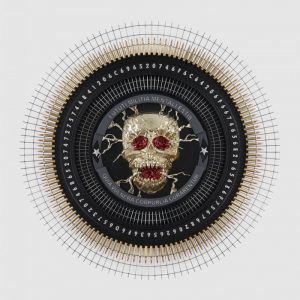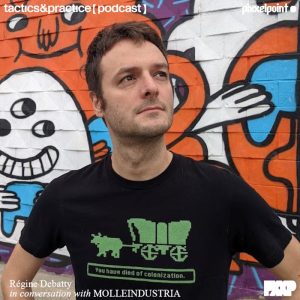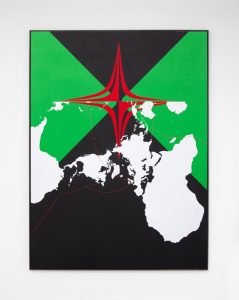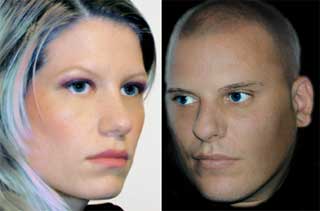 The lazy way: Ubermorgen Ubermorgen is a group of artists in Vienna, Austria, founded in 1999 by Hans Bernhard (founder of etoy) and Lizvlx. Ubermorgen focuses on exploring contemporary legal issues, especially those of security, privacy and copyright. Übermorgen is the German word for “the day after tomorrow” or “super-tomorrow”.
The lazy way: Ubermorgen Ubermorgen is a group of artists in Vienna, Austria, founded in 1999 by Hans Bernhard (founder of etoy) and Lizvlx. Ubermorgen focuses on exploring contemporary legal issues, especially those of security, privacy and copyright. Übermorgen is the German word for “the day after tomorrow” or “super-tomorrow”.
To those who have the guts to say to my face that i’m some kind of “new media art” guru, i like to highlight that i arrived pretty late on the field. Approx. two years ago. I conceived a crash course for my ignorant self (this blog), went to festivals, read books on the subjects, etc. I then realised how lucky i was: there are so many bad/boring net.art projects and interactive installations i never got to see. As it happens in other disciplines some artists who were working with the net when i still didn’t know how to use a computer have disapeared (not necessarily the worse ones) or have started to repeat themselves again and again. Others just stand out. Lizvlx and Hans Bernhard from Ubermorgen belong to the latest category.
I got to know their work during the 2005 edition of Ars Electronica, one of their most talked-about project, [V]ote-auction, had just received a Nica in the Net Vision category. During the 2000 election campaign opposing Al Gore to George W. Bush, this online auctioning platform gave voters the opportunity to sell their vote to the highest bidder. The project gained enormous media attention, the legal system started an investigation in 14 States, so did the FBI, the CIA, etc. In total the project generated 2 500 news features. Ubermorgen calls this type of action “actionism” and “media-hacking” and the experience inspired them to come up with The Injunction Generator (honorary mention at ars), a software module which claims to make on request legal injunctions and personalized documentation in .rtf/.pdf format to force a site into taking its contents offline (just like ubermorgen was obliged to do with Vote auction).
Of course, there’s more to Ubermorgen than [V]ote-Auction…
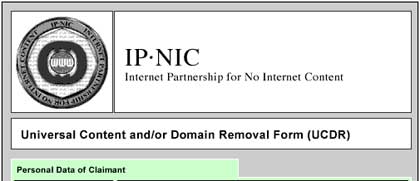 Injunction Generator
Injunction Generator
What’s your background? How did you get to become a artist? if the label “artist” suits a “maverick Austrian businessman” like you…
Hans: Artist is fine with me, it makes things less complicated. I studied visual media art at the University of Applied Arts in Vienna Austria with Professor Peter Weibel, Aesthetics in Wuppertal (Germany) with Bazon Brock, Art History at Art Center College of Design Pasadena (USA) with Peter Lunenfeld and Digital Culture with Lev Manovich at UCSD (USA). The becoming of an artist was rather simple, it was all about useability. Although in the beginning – with etoy – we did not really consider our work as art but rather as radical self-experiments, social and technological experiments – but after eliminating all other fields (such as sports, politics, etc…) there was nothing left but art. Today i consider this process to be freestyle research. Conceptual art is crossed with experimental research and massmedia stunts – but the products (sites, digital images, sculptures, emails, logfiles, paintings, drawings, etc.) are positioned in the art context. During project-phases we play different roles and use a series of aliases, sometimes we even swap aliases with other entities (for example the andreas bichlbauer/andy bichlbaum character of the Yesmen is such a shared character-set). With such identity changes, we position ourselves as doctors, businesspeople, retired military personell or teenagers.
lizvlx: Ohh, dwelling on my background. Well, yes, I pretty much always wanted to be an artist (besides wanting to be an archeologist or physicist), but I found the art schools to be a bit boring, to be honest, so I quit art school (I did painting and tapistry) and went on to study commercial sciences and market research, which was absolutely interesting. I continued working in the arts on the side until the web started to really develop in the early 90ies, and then I shifted my focus onto coding, pixeldrawing, digital manipulation etc. My focus was always on being userunfriendly, and I am actually quite happy working together with Hans, because with him I can work very freely and I don’t feel stuck in any bad compromise (which often the case when working together). It is great, I can work and do not
need to really talk about it, and Hans can talk without being controlled by me, we don’t need to agree with one another in order to work together.
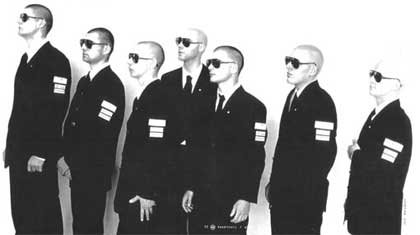 etoy – the first street-gang on the internet
etoy – the first street-gang on the internet
You’re one of the founders of the legendary etoy, the “first street-gang on the internet.” How do you feel when you look back at your etoy activities during the late 90s?
Hans: It’s great to be a founding member of etoy – the etoy.CORPORATION. Today i am glad about my 1999-move away from the operating business into the steering committee (etoy.holding), with the contemporary etoy i would not want to be involved further than dealing with strategy, finances and trademarks. Our edge-game was just happening at the perfect moment in internet history (1994-1999). We were experimenting in the fields of internet-technology, drugs (especially LSD and MDMA), economics, politics and social engineering. Corporate Switzerland, Viennese Actionists and the Dot Com Boom gave us the tools (corporate identity manuals, die Aktion, business plans) to work on a piece of radical corporate software (etoy). My main technique is sampling / collage. Influenced by New York rap music from the 1980s, i learned to agressively copy & paste and to invisibly mix conceptual elements with visuals and philosophy with code. The myth of the pop-star and the construction of a fascist global uber-corporation was the driving force behind etoy. This fusion of drugs and technology was blended with results of our analysis of Andy Warhol, Archigram, Futurism, Michael Milken and contemporary boys groups such as The Backstreet Boys. etoy was organized like a Formula-1 team. Highly efficient, strongly hierarchical, very high-tech, glamour and stylish to the outside. But deep inside, etoy was a hardcore cult.
What motivated [V]ote-Auction?
lizvlx: Getting started was easy – had we not gotten engaged, then the project would have been terminated by the early intervention of New York jurisdiction. The moment we got into working with it, it got a natural flow, Hans working dayshifts in Vienna and Sofia and me working all night in Berlin. Much motivation came from my personal disrespect for the numerous legal systems of this world – not because they are unfair or something, but because of the bureaucrazy, the anti-communication and the all time favors for the party with more power and money. But I grew up with all that, as my dad is a lawyer, so I cannot be scared by being sent legal paper anyway, it is just ink on paper and lots of emotions put into some kind of very beautiful legal poetry.
Hans: The project was brought to us by an american student, James Baumgartner. He invented Vote-Auction version 0.9. Due to massive legal pressure (New York City Election Committe, FBI) he sold it to us for a undisclosed sum. Our motivation was to run it as a global communication experiment and to radically push the boundaries of massmedia hacking, legal art and [F]originals as far as humanly possible – under the constant strain of legal (13 District Attorneys, Federal Attorney Janet Reno, FBI, CIA, NSA) and social pressure (Family, Friends, Community, Lawyers).
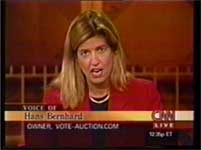
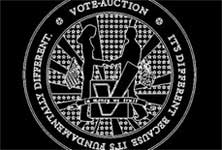 [V]ote-Auction
[V]ote-Auction
Did you expect the echo in the mass media and in courts to be as wide as it has been?
Hans: No. Although we felt from the beginning that there was a good potential within the project, but initially it was running parallel to our business activites and other projects. But soon it took over and consumed our whole time and energy. For four months we were mainly dealing with the media (up to 30 interviews per day, Radio, TV, Online, Print), with lawyers, with district attorneys, with the community and with the users. We had crash courses in international law and our lawyers had crash courses in internet technology. The
only ones standing in the rain were the district attorneys, federal attorney Janet Reno and the FBI. They spent millions of dollars investigating the case without ever having the slightest idea what it was all about. In a 27 min. primetime feature on CNN, lawyers and politicians tried to determine whether this was an art project or a actual business by pervert eastern European business-people (our project slogan: Vote-Auction – bringing capitalism and democracy closer together).
Lizvlx: Ha, that’s funny – because I did expect it. Well, not all of it, but to me it was pretty clear that it would just have to rise high. First of all, because from the beginning on, one felt that the media people wanted to feature it as much as possible, and second, because American institutions and people like to sue other people more than, for instance, in Europe. And these 2 powers, jurisdiction and the media clusterfeeding one another, so all I had to do was listen carefully to the content of the questions posed and use all
the information so given to me and mirror it back into the media and public again. It was such a real-time job, very charming and fulfilling – I am also very grateful for all the information sent to me by the numerous Vote-Auction users.
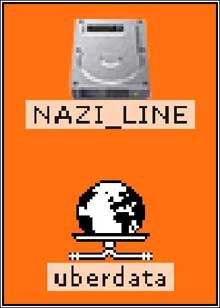 Nazi-line, vote auction, Ars Electronica Jury Hack… You’re not afraid to get enemies? What drives such boldness?
Nazi-line, vote auction, Ars Electronica Jury Hack… You’re not afraid to get enemies? What drives such boldness?
Hans: We are looking for niches to start our experiments. These niches bring us maximum benefit for our basic research and development. We are not opportunistic, money-driven or success-driven, our central motivation is to gain as much information as possible as fast as possible as chaotic as possible and to redistribute this information via digital channels. For this we are willing to put our careers, our money and our time at risk.
What motivates and justifies the amalgamation of fact and fiction that characterizes many of your works?
Hans: net.art, Totalart, Junk Pop, Digital Cocaine, Children of the 1980s. Hans Bernhard radicalizes the relation between fact and fiction by beeing mentally ill. He can not separate collective hallucination (reality) from individual hallucination (fiction), but from time to
time he has a vision of the whole thing. Using psychotropic drugs (see hansbernhardblog ) and having kids, being an artist and a citizen, this situation has to be staged into a Gesamtkunstwerk. Thanks to the new platforms and databases (www, digital archives, mailinglists, logfiles, etc.) Hans was able to invent and create new forms of representation and to vertically infiltrate others with his research and identities. Such a self-experiment is his way to end speculations about retro-visions of the future and to position himself as a ex-neo-futurist. He understands himself in the tradition of the great italian artist Guglielmo Achille Cavellini and his strategy of self-historicization. UBERMORGEN.COM`s work is unique not because of what we do but because how, when and where we do it. The Computer and The Network create our art and combine every aspect of it.
UBERMORGEN.COM is metaphysically influenced by Lawrence Weiner and practically enhanced by ever reinventing Madonna, Jean Tinguely, the Nouveaux Réalistes and by the hardcore Viennese Actionists. Today we mesh and route aggressive tactical behaviour with conservative fine art in a practical and theoretical compound.
I get the feeling that your actions provide you with a lot of fun. Am i wrong?
Hans: There is only one answer: 42.
Lizvlx: Well, i personally prefer the term “lust” to “fun”. That means, yes, i am lust-driven. I try to get a kick out of the work i do, and if some actions we get ourselves into produce amusement, then i do surely not regard the grin on my face as one out of “fun” but
rather something that rises from the joy of fulfillment, an element of lust. (The term “lust” is originally German and in german, the words “lustig” (fun(ny)) and “lust” (lust, eagerness, willingness) are all the same. I do not like the english term “fun” because it focuses only on a superficial element of entertainment).
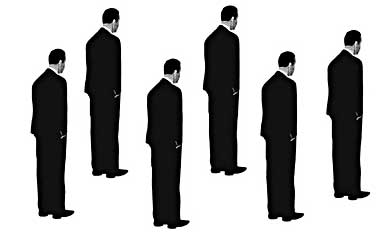 Google Will Eat Itself (GWEI) criticizes Google’s power and omnipresence. Isn’t Google everyone’s friend?
Google Will Eat Itself (GWEI) criticizes Google’s power and omnipresence. Isn’t Google everyone’s friend?
Hans: Google Will Eat Itself (GWEI) (a project in collaboration with Alessandro Ludovico and Paolo Cirio) is a purely conceptual piece, and it is a paradox. It can be reduced to the simple instructions of how to have a ever-growing giant eat itself (auto-cannibalistic) while the project itself empowers the giant to grow even faster. I would not say that GWEI criticizes Google, it rather experiments with the new global click-economy we are now all part of. We perform our perverted research inside Googles most sensitive business field (The Adsense Program is Google’s main revenue booster).
Lizvlx: Google cannot be anyone’s friend. Companies are no friends, they are not people and thus no friends. I cannot stand it when people use human emotions in connection to legal entities and/or marketing constructions. Well and then, i would personally prefer
friends that do not possess omnipresence, i rather go for the personal understanding and private chitty-chat than the global know-it-all. Regarding the criticizing of google – i guess, we are just trying to improve the system. As an experiment. the google people had a great idea when they set up the advertising scheme on google. But just like with any other system and/or software, you can code additional functions to enhance the existing software and take it further. This is what they call progress, isn’t it?
How did Google react to your action?
Hans. Just a couple of weeks ago we received the first official Google letter from their legal department in Hamburg (Germany). They are extremely friendly in their wording and they ask as to consider that our project is against Googles Terms and therefore illegal. Also they state that they understand that it is an art project but still we had to stop immediately. For us this is new territory because Google usually does not communicate human-to-human (they have machines doing that for them). Our favourite vintage Apple System Sound is: “Sosumi”.
Can you tell us something about your new projects? There are rumours about a follow-up of GWEI…
Lizvlx: We are working on a new project together with Paolo Cirio and Alessandro Ludovico. The name is ”
Amazon Noir“. The Plot: “The Bad Guys (The Amazon Noir Crew: Cirio, Lizvlx, Ludovico, Bernhard) steal copyrighted books from Amazon.com – using sophisticated robot-perversion-technology coded by supervillain Paolo Cirio. A massive media fight and a brutal legal fight escalates into an online showdown with the heist at the center of the story. Lizvlx from UBERMORGEN.COM has daily shoot outs with the global massmedia, Ludovico and Bernhard hardly resist kickback-bribes from powerful Amazon.com and Cirio violently pushes the boundary of copyright (just pixels on a screen – just ink on paper). Betrayal, blasphemy and pessimism splits the gang of bad guys. In the end the good guys (Amazon.com) win and drive off into the blistering sun with the
beautiful and seductive femme fatale (the massmedia).”
Amazon Noir, Official Release: Nov 15, 2006
Any Austrian artist(s) whose work should get more attention from the public?
Lizvlx: Judith Fegerl, Kasper Kovitz.
Hans: Susanne Schuda, Grischinka Teufl, Lia (she gets lots of attention, but she is one of my all time favs), Monochrom.
Thanks Lizvlx and Hans!


